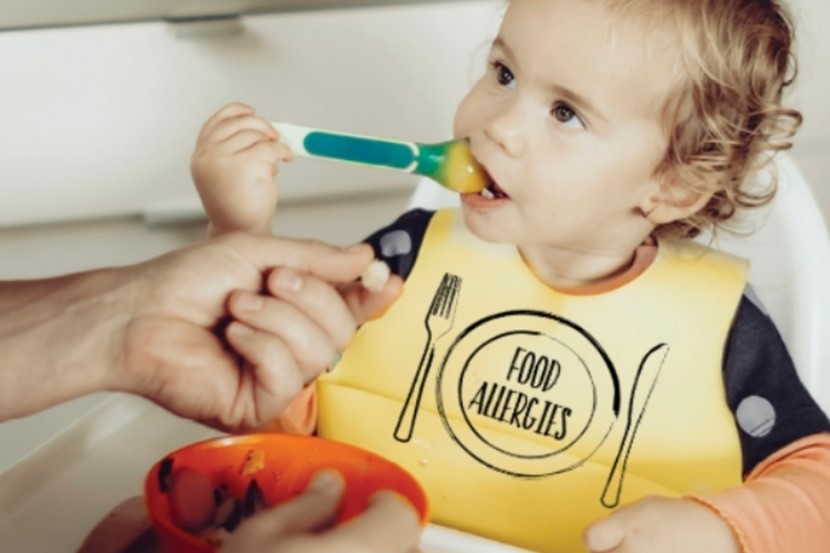Tips for dealing with today’s food allergies

When your child has an allergy, food can spell fear. But help is at hand. Nutritionist Hannah Gentile shares tools to help parents manage.
I very clearly remember my personal introduction to food allergies. We were on holiday in Florida with our then seven-month-old daughter and my husband’s family. We were just getting into the swing of solid foods, and our daughter ate some mashed banana, which she had had a couple of times previously. We put our little girl and her one-year-old cousin to bed without incident. About 30 minutes later I heard what sounded like her coughing. I went to check on her but she promptly stopped, so I decided against disturbing her and left it. About 10 minutes later the coughing started again, more violently, and this time it sounded like gagging. My husband and I raced into her room to find her covered in vomit and very lethargic. I picked her up and started stripping her off. She was extremely pale, cold and floppy. It was the most frightening thing I’ve had to deal with. Thankfully both my brother-in-law and sister-in-law are doctors, so they got me to get in the bath with her whilst they monitored the situation. After another hour she began to perk up, and then within 90 minutes, she was back to her usual happy self and keen to go back to bed.
So what happened? Sofia had suffered one type of allergic reaction: FPIES, or Food Protein Induced Enterocolitis Syndrome. This is a type usually reserved for children under the age of two years, and they typically grow out of it.
Any food can be an allergen. However, the most common are seafood, egg, milk, wheat, nuts and soy. Food allergies can start any time in life, and in some circumstances you can grow out of them.
So what is the difference between an allergy and intolerance?
An allergy is an immune-mediated response. It can be life- threatening if the sufferer has an anaphylactic response where the throat, lips and tongue swell up causing asphyxiation. It can also be characterised by other immune system responses, such as wheezing and a rash or hives.
An intolerance, on the other hand, is not to do with the immune system. It involves the digestive system with symptoms typically being stomach pain or discomfort, diarrhoea, gassiness and sometimes vomiting. It is rarely life-threatening, however if left untreated, can cause nutritional deficiencies which theoretically may become fatal – particularly in young children or those with other medical complications.
Why do more people seem to have allergies or intolerances these days?
We are getting much better at recognising and diagnosing food intolerances, particularly, which has led to an apparent increase. As far as allergies are concerned, with the advent of an EpiPen, anaphylaxis is now survivable. Historically, children with an anaphylactic food allergy would have most probably died in early childhood without people necessarily knowing the cause. Now these children can lead pretty normal lives into old age.
Additionally, with the rise in alternative therapies (and very little regulation of the industry), there has been an increase in unofficial diagnoses with little or no medical backing. That’s not to say that none of these diagnoses are accurate - some people will indeed have an intolerance but some may not, resulting in people actually making choices with their diet based on lifestyle preference rather than medical imperative. I think that, just like vegetarianism, we need to start looking at dairy- or gluten-free as a lifestyle choice when not for medical reasons, and not feel the need to label these as intolerances for legitimacy. It is very important to get your diagnosis from an immunologist.


- Put together a food allergy action plan, in collaboration with your daycare or school.
Meet with any staff who will play a role in managing your child’s allergy. This could include the daycare nurse, administration/receptionist, teacher, head of department and manager/principal. Areas which should be covered include:
☙ A step-by-step plan of how and where any medication needs to be stored, retrieved if needed, administered, and who needs to be called if a reaction occurs.
☙ Make sure expiry dates for any medication stored are for the end of the year. That way you just have to get one new script at the start of the year, and don’t have to remember to replace medication part way through.
☙ Know the daycare’s plan around eliminating the food. Will they make the whole centre free of that allergen, or is it just the kids in your child’s area? Will they expect your child to eat in isolation? The daycare needs to not just focus on physical wellbeing, but mental wellbeing as well, and making sure your child does not feel socially isolated.
☙ Who needs to be trained in how to administer any medication? Will the daycare make sure that happens?
☙ What’s your daycare’s emergency plan? For example, if the centre had to be evacuated, who is responsible for bringing medication with them? Similarly, how will field trips be handled?
☙ Discuss area/classroom-specific activities, such as hand washing at the start of the day and after lunch. Will events or festivities at daycare be celebrated with non-food related activities, so that all children can be included?
- Keep an EpiPen on hand, and make sure everyone caring for your child is confident using it.
When your child is not with you, they need to be with someone else who is trained to administer their medication.
- Turn food moments into teachable moments.
Your child can learn from a young age which foods they need to avoid. Teach them what they need to say to adults who offer them food, as well as what to do if they are starting to feel unwell after eating.
- Work with non-food rewards.
It’s important children still feel included in fun events. Goodie bags at birthday parties, rewards for good behaviour and fun family outings don’t need to be centred around food.
- Prepare as much from scratch as possible.
Many store-bought products have cross-contamination, which is very problematic for highly sensitive children. Keep your kitchen free of the problem allergen, and cook as much with whole ingredients as possible. The closest a food is to its natural form, the less chance of contamination.
- Read both the front and back of a packet.
Even if something says it’s dairy-free, check that indeed it is by reading the ingredients on the back.
- Think about seeing a psychologist in the short term, as having a child diagnosed with a life-threatening condition can be difficult for the whole family to adjust to.
Seeing a psychologist can help you work through any anxiety or depression which might arise as you deal with your child’s allergy.
- Work with a dietitian or registered nutritionist.
Navigating a new allergy by yourself can be tough. Have a chat to someone who specialises in allergies and intolerances to understand how you can best manage your child’s condition.
- Find a support group.
Professionals are great sources of information. However, it can also be useful to have a group of peers going through the same process as you. There are always lessons they can share, and things they can say to help you through the tough times.

AS FEATURED IN ISSUE 42 OF OHbaby! MAGAZINE. CHECK OUT OTHER ARTICLES IN THIS ISSUE BELOW

















